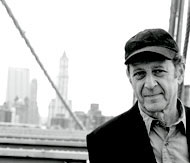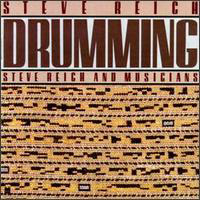Concert
Performed by
Bang on a Can All-Stars with Nick Zammuto
and Steve Reich
With compositions by Steve Reich
and Julia Wolfe, Florent Ghys, Christian Marclary, Mira Calix, David Lang, Evan Ziporyn, Michael Gordon, Tyondal Braxton and Nick Zammutto
Kresge Auditorium, MIT
Cambridge
Bang on a Can All-Stars:
Ashley Bathgate (cello), Robert Black (bass), Vicky Chow (piano and keyboard), David Cossin (percussion), Mark Stewart (guitar), Evan Ziporyn (clarinets and piano), Andrew Cotton (sound engineer)
Steve Reich is a minimalist composer who has been developing a series of rhythmically inspired works over the past several decades. I remember first hearing about his work in the 1970s, when his piece, Drumming, had made something of a splash. Later on, I much enjoyed listening to his recording, Tehillim (Psalms), a minimalist, but thematically inspired, work.
The evening began with an informal interview with Reich conducted by Julia Wolfe, one of the founders of Bang on a Can All-Stars, the contemporary musical ensemble which performed Reich’s works during the second part of this evening’s performance.
The first half of the program was devoted to Bang on a Can’s performance of Field Recordings (2012), an amalgam of pieces by nine composers played in sequence as though all of one unit.
All the individual parts were conceived in the same way: to take a recording of the composer’s choosing and to build upon it compositionally. Most of the pieces were based on audio recordings, but there were a couple of video recordings. Though each piece had its own character, they worked well as a grouping. Overall, there was a good amount of wit and humor in the aggregate, lending lightness and diversion to a compilation that went on for more than an hour.
Julia Wolfe’s Reeling was based on a traditional French Canadian recording, with clarinet, then piano, then the entire ensemble playing in parallel to the recorded vocalist, and finally taking precedence over it. Evan Ziporyn’s Wargasari was also based on a tribal melody. It was a pleasure to hear both composers improvise layers of contemporary embellishments over these traditional voices and morph them into independent thematic units.
Florent Ghys’s An Open Cage was based on a recording of John Cage’s voice, with music gradually and effectively overtaking the rhythm of the words like a postmodern inverse form of karaoke.
Christian Marclay’s Fade to Slide brought the sound of saws and other industrial motifs in with a wide variety of video images that made one think of a mini Koyaanisqatsi (the 1982 film of a visual tone poem directed by Godfrey Reggio with music by Philip Glass).
Nick Zammuto’s Real Beauty Turns included a very funny video of shots of women’s beauty stylings, supplemented with rhythmically assertive melodies and the occasional invocation of the phrase “real beauty turns” which gave the whole piece energy and appeal.
In the discussion, Reich noted that the first piece of his on the program, Clapping Music (1972) was inspired by flamenco. Apparently, he and a friend had gone out to hear some flamenco music and though that evening he was not so impressed with the guitar playing, he was very impressed with the rigorously rhythmic clapping that accompanied it.
For this concert, Reich and David Cossin performed this maddeningly difficult clapping duo, seemingly exhausting, with absolute conviction and precision. It was something to hear and to watch.
Reich observed that Electric Counterpoint (1987), the solo guitar piece (with recorded accompaniment) that occupied the center of the second half of the program, was written originally for the jazz guitarist Pat Metheny. Apparently in exploring the possibility of doing the piece Metheny said to Reich something like “just write single notes and I’ll be able to do it,” a funny, unexpected and fascinating footnote.
Mark Stewart, who performed the piece, did it with clarity and conviction. The piece, like much of Reich’s work, has a simple tonality that informs the more complex rhythmic structure. But here, as well, the homomorphic tonal interplay between the recorded notes and the guitar notes, though neither particularly melodic nor harmonic, was reinforcingly resonant and evocative.

According to Reich, 2×5 (2008), premiered in Boston at this event, is driven by the bass. Robert Black (electric bass) held up the bargain in doing so. Derek Johnson and Mark Stewart (electric guitars) led with subtly contrapuntal dueling that relied on an evident accuracy of communication. David Cossin (drums) provided a driving, but consistently smooth, rhythmic foundation, and Evan Ziporyn and Vicky Chow (pianos) filled out the tonal sphere adroitly. Though involving a more elaborate orchestration, this piece brought out familiar Reichian motifs: a determined but varied rhythm, carried by general, but not complicated, tonal shifts.
Overall, this was a fun and stimulating evening. it was so nice to see Steve Reich in good form at the age of 75, and great to hear the Bang on a Can All-Stars do their musically expert and hip thing another time.
– BADMan




Leave a Reply